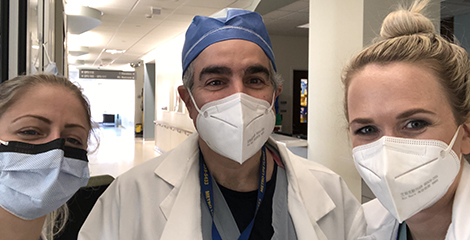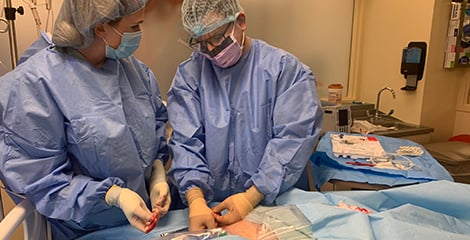Curriculum
Year 1: Surgical Critical Care Fellowship
Didactic

Over the last few years, we have curated the Decker Scientific American SCC curriculum to identify the highest yield topics and question banks. The sessions are held weekly with faculty mentors to review concepts and give context based on experience.
Starting August 2022 we will offer an SCC fellow bootcamp that will front load critical content such as respiratory failure, ventilator waveform and dyssynchrony, and more into the first month of service so that the rest of the year can be spent fine-tuning those critical clinical skills. “Experts in critical care seminar series” provides additional exposure to timely critical care topics.
Longitudinal
Some topics deserve more time and practice. We have designed several longitudinal curricula that require deliberate practice for skill development, which is followed by adaptive expertise using research or clinical patient encounters. We know that this is the best way to get cognitive integration and transfer these skills for the long term – how we make experts.
- Ultrasound (US): Year-long curriculum consisting of weekly multidisciplinary lecture series and scanning sessions that teaches the basic windows, builds case logs, and prepares for the CCExAM in critical care echocardiography. We like our fellows to achieve at least basic CCE status, but some fellows have gained enough skill to become US faculty or develop US programs elsewhere.
- Airway: Begins with bootcamp for airway skills, and continues throughout the year with case log from trauma bay, ICU, and other settings.
- RRT (renal replacement therapy): After the didactic renal curriculum, fellows spend a 2 week rotation with the nephrology team writing RRT orders for case logs to establish RRT privileges at accepting institutions.
- Nutrition: Initial nutrition topics are covered in bootcamp including nutrition assessment, identification of high-risk patients, and enteral or parenteral nutrition orders. Fellows will then work with critical care registered dietitian to prescribe nutrition throughout the course of the year for case logs.
- Journal club: Fellows present weekly journal club article as part of monthly ICU rotation. Focus is on critical appraisal of ICU literature.
- Quality control/Process Improvement: Fellows will present ICU focused cases to core faculty monthly with focus on QA/QC process, often a good source of ACGME-required QI project. Fellows given protected time for multiple monthly trauma PI sessions.
Rotations
Each of these rotations offers a unique patient population and ICU experience:
- SICU: 10 beds, primary unit for cardiothoracic, vascular, complex HPB, colorectal, and acute care surgery patients, as well as overflow for trauma and neurosurgery patients.
- TICU: 14 beds, primary unit for trauma patients, overflow from SICU.
- BICU: 6-12 beds, only adult and pediatric burn center in Ohio.
- NCC: 6-10 beds, primary unit for stroke certified center, neurosurgery and complex spine cases
- Coming Soon
- CT/ICU for exposure to complex cardiac and support devices
- Transplant for exposure to immunosuppressed, complex ICU patients
Teaching
Teaching remains the cornerstone of our mission at MetroHealth. We have off-site rotators come from all over the state to work with us, and we ask all our residents and fellows to model teaching excellence. There are options for advanced teaching opportunities including ATLS and ASSET course instructors, advanced simulation programs, and bootcamps for medical students and residents.
Research
MetroHealth has a robust team-based engine leading to more than 20 publications per year in clinical outcomes, quality, and educational research. Trainees are encouraged to participate in any ongoing project at any phase to learn relevant skills, and there are multiple opportunities for authorship. Fellows are expected to prepare at least one project for local and national presentation with the support of faculty throughout the process – even for novice researchers!
Year 2: Acute Care Surgery Fellowship
Those exceptional candidates pursuing a second year of fellowship are considered junior faculty members with available supervision and a goal of creating leaders in acute care surgery. This second year provides additional leadership training, exposure, and experience that makes graduates especially competitive in the job market. Approximately six months are spent meeting case logs consistent with the American Association for the Surgery of Trauma (AAST) requirements and any necessary focused clinical exposure. The remaining time is spent in one or more of the following specialized tracks:
- Trauma Program Leadership: Opportunities to learn role of trauma medical director, coordination with hospital operations, robust quality and process improvement.
- Burns: Exposure to burn resuscitation, burn debridement and grafting, as well as outpatient oversight
- Clinical Outcomes Research: Pursue an individual area of research interest, present and publish projects at national meetings, and develop grant writing skills.